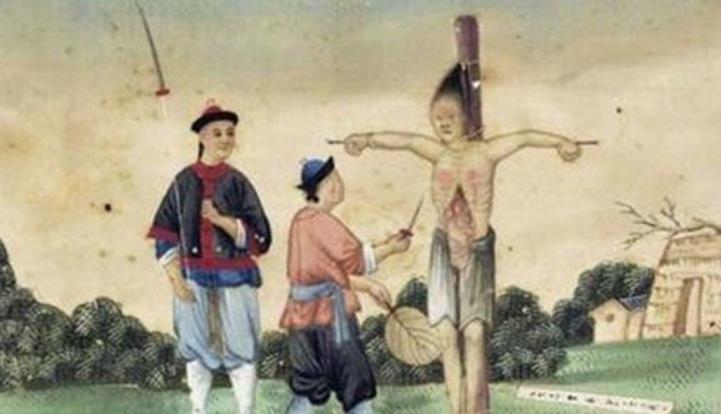In ancient times, some bad people, some people who committed crimes, often used the word unforgivable!
For example, if you are single, your parents look at you like a heinous person!
For example, if you don't have children after marriage, your parents look at you like a heinous person!
For example, if you get married on Valentine's Day, Christmas, Goddess Day, or even Children's Day, if you don't buy a gift for your wife and girlfriend, in their eyes, you are a heinous person!
Then you ask what is the most heinous person, and isn't this person a man?
All of the above is just a joke!

What kind of sin does the truly heinous person commit? Which of the ten evils of the ten unforgivable evils are these ten evils?
The origin of the Ten Evils is recorded to have evolved over the "crime of great rebellion and disrespect" in the criminal law system of the Western Han Dynasty.
But the real formation was in the period of the Northern and Southern Dynasties and Northern Qi, why did it take shape in Northern Qi! Mainly the sons of the Northern Qi Gao family are all more than a bull fork lord.
To what extent is the bullfork?
It can be said that there is no normal person!
Because normal people start crazy to cut others, and the children of the Northern Qi Gao family, they start crazy to cut themselves!
In the "Qi Law" of Northern Qi, the king of Zhao County at that time played the twelve chapters of the Qi Law, which listed ten felonies.
The ten are:
1: Treason.
2: Great reverse.
Three: Rebellion.
Four: Surrender.
Five: Evil rebellion.
Six: No.
Seven: Disrespectful.
Eight: No filial piety.
Nine: Unrighteousness.
Ten: Civil unrest.
At that time, as long as these ten sins were committed, it was really called Jesus who could not keep people!
Of course, these ten sins in this period are not called the ten evils, but the ten felonies, so what period is officially called the ten evils?
It was the Sui Dynasty period!
The Sui Dynasty regained the unity of the world since the Southern and Northern Dynasties, and the Sui Emperor Yang Jian was also an ancient Ming Emperor who was very concerned about the stability of civil society, so he was very concerned about the laws of the Sui Dynasty.
At that time, Buddhism was flourishing, so the ten evils in Buddhism were introduced into the law, and these ten evils also officially replaced the ten serious sins of Northern Qi.
The ten evils are:
One: rebellion.
Rebellion refers to an attempt to overthrow the imperial court, which has always been the first of the ten evils in ancient history, because it affects the dominance of those in power, so the criminal law is also the heaviest.
Second: plotting a great rebellion.
The crime of great rebellion refers to the destruction of the royal family's temples, mausoleums and palaces, the royal family has always attached great importance to the temples and mausoleums, such as the temple symbolizes the feng shui of the royal family, once destroyed, it will cause the country and mountains to be unstable, which is actually related to the ancient people's thoughts are more feudal and superstitious, the place of the mausoleum is generally called the dragon vein, so there is a broken dragon vein in ancient times.
Third: conspiracy.
Rebellion refers to betraying the country, betraying the court, and betraying the monarch!
Fourth: evil rebellion.
Rebellion refers to the beating and murder of grandparents, parents, uncles, and other dignitaries.
Fifth: No.
It doesn't mean killing innocents.
Sixth: Great disrespect.
Great disrespect refers to an offense to the dignity of the emperor and the royal family.
Seventh: Filial piety.
Filial piety refers to disrespect for grandparents, parents, or marriage, entertainment, etc. during the period of filial piety.
Eighth: Discord.
Discord refers to the murder of certain relatives, or the beating of a woman, the prosecution of a husband, and so on.
Nine: Unrighteousness.
Injustice refers to the mutual killing of officials, the killing of chiefs by soldiers, the killing of teachers by students, the death of women by hearing the death of their husbands without mourning, and so on.
Ten: Civil unrest.
Civil unrest refers to adultery between relatives, etc.
The reason why these ten evils were listed as heavy punishments was mainly because these ten evils directly endangered the core of the feudal autocratic system at that time - the power of the monarch, the divine power, the patriarchal power and the husband's power, so since the Sui Dynasty, the ten evils were determined for the first time in the "Kai Huang Law", and since then, through the Tang, Song, Yuan, Ming, and Qing dynasties, those who have violated the ten evil laws cannot all be pardoned.
Hence the word heinous, and it has since been used to describe those who have committed grave crimes!